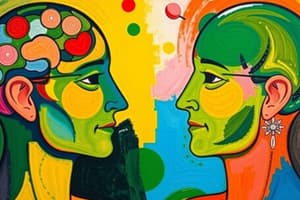Podcast
Questions and Answers
Which brain region is responsible for automatic processing, emotional life, and memory?
Which brain region is responsible for automatic processing, emotional life, and memory?
- Cerebral cortex
- Cerebellum
- Amygdala-limbic system (correct)
- Frontal lobe/prefrontal cortex
What is the term for the mental model of ourselves, others, objects, and events?
What is the term for the mental model of ourselves, others, objects, and events?
- Schema (correct)
- Metaphor
- Heuristic
- Priming
What is the name of the effect where our expectations about others influence how they behave?
What is the name of the effect where our expectations about others influence how they behave?
- Actor-observer bias
- Self-serving bias
- Fundamental attribution bias
- Pygmalion effect (correct)
What is the term for the strategy based on the extent to which current stimuli or events resemble other stimuli/categories?
What is the term for the strategy based on the extent to which current stimuli or events resemble other stimuli/categories?
What is the term for the tendency to use a number, value, or personal experience as a starting point for decision-making?
What is the term for the tendency to use a number, value, or personal experience as a starting point for decision-making?
What is the name of the bias where we overestimate the extent to which our behavior reflects our traits and attitudes?
What is the name of the bias where we overestimate the extent to which our behavior reflects our traits and attitudes?
Which thinking style focuses on the overall context and relationships between objects?
Which thinking style focuses on the overall context and relationships between objects?
What is the term for the phenomenon where we are more sensitive to negative than to positive information?
What is the term for the phenomenon where we are more sensitive to negative than to positive information?
What is the term for the belief that one is more likely than others to experience positive events and less likely to experience negative ones?
What is the term for the belief that one is more likely than others to experience positive events and less likely to experience negative ones?
What is the term for the inability to spot a visual stimulus that is introduced or changed?
What is the term for the inability to spot a visual stimulus that is introduced or changed?
Flashcards are hidden until you start studying
Study Notes
Social Cognition
- Social cognition refers to how we think about ourselves and the social world, including selecting, interpreting, remembering, and using social information to make decisions and judgments.
Automatic vs. Controlled Processing
- Automatic processing involves simple, intuitive judgments, and is associated with the amygdala-limbic system, also known as the "old mammalian" brain.
- Controlled processing involves careful, conscious, self-controlled, strategic, and long-term goal-oriented thinking, and is associated with executive functions in the frontal lobe/prefrontal cortex.
Schemas
- Schemas are mental models of ourselves, others, objects, and events, based on our own experiences and secondhand sources.
- Schemas influence our behavior, especially when we are under high cognitive load, in ambiguous situations, or when they are strong, well-developed, accessible, and applicable.
- Once activated, schemas exert a strong influence on our behavior and fill in gaps in our knowledge.
- The perseverance effect occurs when schemas tend to remain unchanged, even when contradictory information is present.
Making Schemas Come True
- Schemas have a self-confirming nature and can create a self-fulfilling prophecy (Pygmalion effect), where our expectations about others influence how we act towards them, causing them to behave consistently with our expectations.
- Automatic goal pursuit involves pursuing goals that have been primed.
- Automatic decision-making can be improved by using both conscious thinking and distraction (intermittently) and heuristics.
Heuristics and Biases
- Metaphors about the body and mind (embodied cognition) can affect how we evaluate social stimuli and act, especially when primed.
- Heuristics are mental shortcuts that enable rapid and efficient decision-making, but can also lead to biases.
- The representativeness heuristic involves judging the likelihood of an event based on how similar it is to a typical case, often ignoring base rates.
- The availability heuristic involves judging the likelihood of an event based on how easily it comes to mind.
- The anchoring and adjustment heuristic involves starting with an initial value or experience and making adjustments, often insufficiently.
Culture and Social Cognition
- Schemas can differ across cultures, with holistic thinking styles (focusing on context) prevalent in Eastern cultures and analytic thinking styles (focusing on object properties) prevalent in Western cultures.
Biases in Social Cognition
- Automatisms can be both beneficial and problematic.
- The fundamental attribution bias involves overestimating the role of personality traits in shaping behavior, and is culture-dependent.
- Other biases include actor-observer bias, self-serving bias, negativity bias, optimistic bias, overconfidence barrier, planning fallacy, and change blindness.
Studying That Suits You
Use AI to generate personalized quizzes and flashcards to suit your learning preferences.




